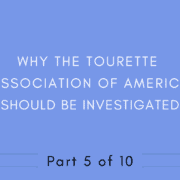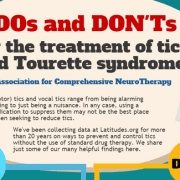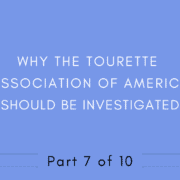Dr. David Perlmutter on Glutathione Therapy for Tourette Syndrome
We have received numerous requests for information related to glutathione supplementation. We asked Dr. David Perlmutter for information on this as well as other topics of interest.
Latitudes: Dr. Perlmutter, first let me congratulate you on your recent Linus Pauling Functional Medicine Award for your work in clinical applications for neurology. As you know, we have an interest in neurological movement disorders, particularly Tourette syndrome. I understand you have been responsible for a breakthrough in treating a different movement disorder — Parkinson’s disease.
Dr. Perlmutter: Thank you. Parkinson’s is an area of major interest to me right now. Our research protocol of using intravenous (IV) glutathione has been approved by the FDA and accepted for evaluation by the National Parkinson’s Foundation. We have been having phenomenal results with that. Glutathione works not only to improve symptoms in those with Parkinson’s but also reduces the prevalence of free radicals, so it reduces the progression of the disease.
Latitudes: Does glutathione raise dopamine levels?
Dr. Perlmutter: Rather than raising the levels, I would say it allows the dopamine in the brain to be more effective. This is not a new concept. Glutathione increases sensitivity to dopamine and serotonin.
Latitudes: How will the current study on Parkinson’s be implemented?
Dr. Perlmutter: We have shifted the study to the University of South Florida. The goal is to show that we can affect symptoms of Parkinson’s in a positive way and slow the progression with glutathione. The hope is that it will be published in a mainstream journal and it will become a mainstream, insurance-covered procedure. It is not proprietary — I don’t “own” it; anyone can do it. There are about 800 doctors around the country using this treatment.
Latitudes: I know a young man about 26 years old who has developed multiple sclerosis (MS) and had one serious episode. Would you recommend that he pursue this approach?
Dr. Perlmutter: Most of our MS patients are on glutathione for purposes of brain protection. The damaging effects of free radicals in MS are mitigated by the IV glutathione. The main reason that people with MS ultimately have destruction of neurons is because of the unchecked activity of free radicals. At the end of the day, that’s what destroys the neurons.
Latitudes: Have you seen cases of Tourette syndrome (TS) in your clinic?
Dr. Perlmutter: We have had some really outstanding results with TS, even with some kids as young as five years of age. In these cases, our work basically involves trying to identify what it is that is inflaming the brain. Often times it’s as simple as doing a food sensitivity panel. But we also supply the patient with important nutritional sources of anti-inflammation mediators. We are very strong on the essential fatty acids, as well as some of the bioflavanoids.
I think the key thing to consider is that we have to identify what, first and foremost, is inflaming the brain in that specific individual. That can vary from person to person. So it is a specific approach to determine the inflammatory mediators in each patient. For some it might be gluten, in others it could be cow’s milk, and in someone else it could be bananas. We need to endeavor to learn what is unique for that patient. We typically use a blood test to determine this.
With Tourette’s, we also think it is important to look for Lyme disease. A study published in the journal Lancet several years ago reported on a child 14 years of age with Lyme disease. When they treated the Lyme disease with antibiotics, the Tourette syndrome symptoms went away. We have occasionally seen that as well in our clinic.
Latitudes: I’m interested in some of the nutritional supplements you have developed. And let me point out that we are not in anyway financially associated with your work or your products. If you were providing nutritional supplementation for TS, for example, would you use your prepared combination products or do you do nutritional testing?
Dr. Perlmutter: We have a general protocol though it is not a cookbook. Truly, the TS is not monofactorial. It is multifactorial. So we do some general things in terms of essential fatty acids (EFAs) and antioxidants. But we first test patients to determine what they are sensitive to, and we also determine where their deficiencies are.
Latitudes: Do you look at other sensitivities besides food — such as traditional allergens?
Dr. Perlmutter: In our practice we have typically found abnormalities of the EFA metabolism or food sensitivity, and we focus on that.
Latitudes: If they have essential fatty acid metabolism problems, do you focus on EFA supplementation or do you seek to somehow correct the metabolism problem?
Dr. Perlmutter: It depends. Often they will be deficient in a specific EFA, which is a manifestation of a metabolic problem. But using the EFA supplementation, you can correct for that metabolic dysfunction.
Latitudes: What can you tell us about your product Brain Sustain?
Dr. Perlmutter: It was designed to be a comprehensive supplement to supply all important brain antioxidants as well as energy upregulators. It’s a powder that is mixed with juice, but juice doesn’t work well for everyone. So we developed NeuroActive (www.neuroactive.com) and it has all the important brain active antioxidants and energy mediators that Brain Sustain has, but it is encapsulated so there is no sugar or flavoring. Diabetics can take it; we use it with children and adults.
Latitudes: Are there any contraindications — are there people who shouldn’t take it?
Dr. Perlmutter: I don’t believe there are any contraindications.
Latitudes: I’ve found your book Brain Recovery.com informative and encouraging.
Dr. Perlmutter: There’s a great deal of information there. Also, a new book, The Better Brain Book, will be published by Putnam next year. It provides a focused approach on understanding how important it is to measure free radical activity and reverse excessive activity for conditions like Alzheimer’s, Parkinson’s, and MS.
Latitudes: Thinking about Tourette syndrome, a lot of people report chemical sensitivities and other hypersensitivities. Does the glutathione perhaps do something specific to help temper these? And can you use it with children?
Dr. Perlmutter: I have successfully and safely used it with children as young as nine. However, we have tried it for Tourette syndrome and not seen a lot happen. The idea behind it is that glutathione helps with liver toxicity. It helps upregulate the ability of the liver to detoxify. But so far we haven’t seen great success with Tourette syndrome, though we have tried.
Latitudes: With the Tourette cases, if they stick with the program you recommend, what type of response do you see?
Dr. Perlmutter: Obviously it is the spectrum. But for some cases it is almost immediate and quite dramatic.
Latitudes: I’m interested in the hyperbaric oxygen treatment you use at your center. I know this is another area where you have been a leader in the treatment of neurological disorders.
Dr. Perlmutter: We have a state-of-the-art facility and have been using it successfully for several conditions such as Parkinson’s, MS, migraine, stroke, and cerebral palsy. The treatment is approved by the FDA and American Medical Association and is widely used throughout the world.
Latitudes: I am wondering if hyperbaric oxygen treatment might be helpful for Tourette syndrome. Though I know it differs significantly from the conditions you mentioned, it’s always on my mind that we may be overlooking a possible treatment for Tourettes.
Dr. Perlmutter: I haven’t used it yet for Tourette syndrome so I can’t say. I’m sure that sooner or later we will end up trying it if a family is interested.
To learn more about glutathione, see Brain Recovery.com
Glutathione is a critically important brain chemical and clearly one of the most important brain antioxidants. [It] helps to preserve brain tissues by preventing damage from free radicals — destructive chemicals formed by the normal processes of metabolism, toxic elements in the environment, and as a normal response of the body to challenges by infectious agents or other stresses… Glutathione also acts to recycle vitamin C and vitamin E, which, because of their antioxidant activity, also reduce free radicals in the brain.” Dr. David Perlmutter excerpted from BrainRecovery.com.
David Perlmutter, MD, is a board-certified neurologist, and has achieved international recognition as a leader in the field of complementary medicine. He has devoted his career to researching and applying brain-targeted nutrition. In addition to founding the Perlmutter Health Center, Dr. Perlmutter is the author of the book BrainRecovery.com and hosted a popular prime-time medical television series, LifeGuide with David Perlmutter, MD. He is in practice at Perlmutter Health Center, www.perlhealth.com.










Reduced glutathione has been recommended to me (chemical sensitivities) but both glutathione’s are low in patients according to this study. https://pubmed.ncbi.nlm.nih.gov/20430047/ The missing link that I’m sad Dr Perlmutter doesn’t recognize is the role of everyday neurotoxins which Latitudes is aware. Toluene(common in products)is related to MS and insecticides are related to Parkinsons, etc.. Keeping a home free of these neurotoxins helps all neuro conditions.
Toluene is high component of common fragrance products.